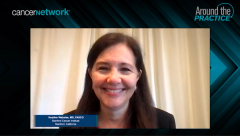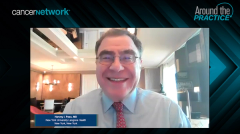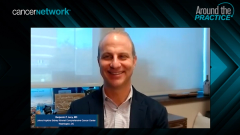
Targeted and IO Therapy in EGFR Exon 19 Deletion–Positive NSCLC
Experts consider when and if it would be appropriate to utilize targeted or immunotherapy in patients with EGFR exon 19 deletion–positive NSCLC.
Episodes in this series

Transcript:
Charu Aggarwal, MD, MPH: I have a question for Heather. Unlike the approval for atezolizumab, which is very specific with stage II and higher resected PD-L1–positive patients, the approval for adjuvant osimertinib is rather broad. It says resected patients, but have you changed your practice to administer it to all patients, including stage I? Or are you focusing on the patients for whom it was included in the intended treatment analysis, stage II and higher?
Heather Wakelee, MD, FASCO: This gets back to the shared decision-making. Before I specifically answer that, I want to echo what Ben had said. Obviously, we don’t have overall survival data from any of these new or adjuvant trials. We don’t have it with the immunotherapy or osimertinib, but we have it from earlier trials that looked at other EGFR TKIs [tyrosine kinase inhibitors] in the adjuvant setting. Those trials had DFS [disease-free survival] benefit. It’s not nearly as robust as what we’ve seen in ADAURA with osimertinib, but there was DFS benefit. There was no OS [overall survival] benefit once there was enough time to call that. That’s where I have a little more caution with the ADAURA and osimertinib.
When we look at immunotherapy, we have the PACIFIC trial, which is different. It was after chemoradiation and not after surgery, but that disease-free survival benefit with durvalumab did translate into a similar OS benefit when you look at the hazard ratios. There’s a precedent there. When you think about mechanisms, if you can get an immune response, that can be continuing. If you’re dealing with a TKI, it’s an on-off. When you stop it, any residual cells that haven’t been annihilated will come back. Therefore, I still have a little caution.
I absolutely use adjuvant osimertinib. Disease-free survival benefit is patient meaningful. The delay of CNS [central nervous system] metastases is patient meaningful. Therefore, it’s something I talk about with all the patients we treat, who have resected tumors and EGFR mutations. I tell them that if you have a higher-stage disease, there’s a higher probability of benefit than if you have lower-stage disease. We talk about cardiac monitoring and other things. For the most part, osimertinib is a relatively livable drug, so I don’t have a problem with that. I’ll prescribe it for someone with stage I, but only after a very long discussion about the pros and cons. It’s not for everybody.
I’m very confused about what we do with adjuvant atezolizumab and adjuvant pembrolizumab. In the subset analyses from both of those trials, the patients whose tumors had EGFR—in IMpower010, only EGFR and high PD-L1; in pembrolizumab in the KEYNOTE-091 study; any EGFR had a profound benefit with adjuvant immunotherapy. We need to reconcile that and understand it. If we have osimertinib, it has a very high probability of working to improve DFS but maybe doesn’t change OS. We don’t know. Hopefully it will. I’m very hopeful it’s positive, so don’t get me wrong on that. But then we have immunotherapy, and it’s not working for as many patients. When it does, it might change the cure. It’s very confusing about what we do.
Charu Aggarwal, MD, MPH: I’m going to change the case a little and ask you: if this was found to be an EGFR exon 20 mutation, how would your treatment plan change? Would you still recommend osimertinib, or would you not because it doesn’t clearly have an indication? Would you recommend immunotherapy instead?
Heather Wakelee, MD, FASCO: For a patient with a tumor with EGFR exon 20, in the adjuvant setting I’d go with chemotherapy. I wouldn’t go with immunotherapy. There’s more to learn about the potential for benefit vs the potential for toxicity. That ratio doesn’t make sense until we have better markers for the EGFR exon 20 patients and when immunotherapy might be beneficial. Osimertinib can be helpful in EGFR exon 20 at higher doses in the metastatic setting, but I certainly wouldn’t use an adjuvant.
Charu Aggarwal, MD, MPH: Ben, your thoughts?
Benjamin P. Levy, MD: I agree. Obviously, the only time I’d think about using adjuvant immunotherapy for EGFR for exon 20 is if the patient clearly needs chemotherapy. But if the patient was a smoker and had a high PD-L1—we’ve had a couple of these—I may consider using adjuvant atezolizumab given the benefit we saw in the PD-L1 greater than 50%, and let PD-L1 supersede the genotype. That’s not something we do often. I’d also mix in the clinical phenotype too. Is that the right answer? I don’t know. But for the most part, I wouldn’t routinely give adjuvant immunotherapy for EGFR exon 20. I’d probably just give adjuvant chemotherapy.
Charu Aggarwal, MD, MPH: That’s great. There’s much more to learn in this space in the new adjuvant setting. As you point out, Heather, we clearly have mixed signals from trials with regard to the management of patients with EGFR-positive disease in the adjuvant setting. There’s much more to learn.
Transcript edited for clarity.
Newsletter
Stay up to date on recent advances in the multidisciplinary approach to cancer.










































